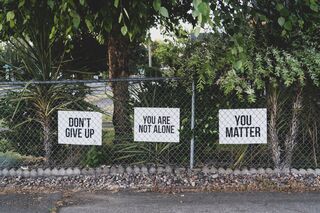Trust
Criminal Justice Change Agent: Friend or Foe?
Change agents are essential to moving forward with criminal justice reform.
Posted July 2, 2021 Reviewed by Devon Frye
Key points
- Criminal justice reform requires that we recruit and retain change agents.
- Transformational leaders must embrace and welcome change in our nation's laws, policies, and programs.
- Change should not be feared, but rather welcomed and embraced.
When I travel by air, I always buy a new book to read on the flight, especially for the longer flights. On a recent roundtrip flight from New Jersey to Mississippi, I read Bill Bratton’s latest book, The Profession: A Memoir of Community, Race, and the Arc of Policing in America, which I thoroughly enjoyed and highly recommend.
For those who don’t know, Bill Bratton served two terms as the police commissioner for the New York City Police Department. Bratton also served as the police commissioner for the Boston Police Department and chief of police for the Los Angeles Police Department. Many consider him to be one of the most well-respected, leading authorities on policing in America. Some refer to him as the modern-day Sir Robert Peel who, among many notable contributions to the policing profession, founded and professionalized London’s Metropolitan Police Department in 1829. Both men are considered visionaries who sought to reinvent policing, and succeeded in many ways.

One comment from Bratton, among many, that caught my attention is (and I’m paraphrasing here) that many in law enforcement equate being a police reformer to being a traitor who is anti-police and therefore, anti-American—and that’s completely false. A reformer is an individual who tries to change and improve something. They're similar to a change agent, an individual who promotes and supports a new way of doing something.
In the words of English novelist, Arnold Bennett, “any change, even for the better, is always accompanied by drawbacks and discomforts.” In the business world, you must embrace change to stay ahead of your competition, so change is encouraged and welcomed—but as a field, criminal justice is extraordinarily resistant to change. We fear it and we often don’t believe those who say that the proposed changes are intended to improve, not threaten our jobs.
As someone who has spent the past 30+ years working in the criminal justice profession as a practitioner and educator, I can attest to the fact that the American criminal justice system is in dire need of reform at every stage—from policing to sentencing to incarceration. Denying that the criminal justice system is in need of reform is, in my view, foolish and unwise.

To move forward with our reform initiatives, we need to actively recruit and retain change agents who respect and value our nation’s criminal justice system but also recognize that it is a system with significant flaws that can no longer be ignored. We need to stop with the constant finger-pointing as to who’s to blame and accept the reality that bipartisan political support is critical to moving forward with our reform initiatives. (I discussed these issues at great length in my forthcoming book, Pursuing and Navigating a Career in Criminal Justice.)
The paucity of research related to change agents within the criminal justice system speaks volumes about the need to actively recruit and retain change agents in spearheading our reform efforts in policing, sentencing, and corrections. These individuals should not be feared but rather welcomed for their progressive thinking.
Therefore, we need to search for and recruit the leaders in our respective fields of policing, sentencing, and corrections who have the character traits of an effective change agent.
Five important qualities of an effective change agent were outlined in a 2019 Michigan State University article. They include the following:
- Flexibility
- Diversified knowledge
- Priority- and results-focused
- Ownership and responsibility
- Effective listening skills (I would take this one a step further by rewording it as "effective interpersonal communication skills")

In a 2012 Forbes magazine article, Maria Gamb noted that the starting point to become an agent of change always begins with you, your relationships with others, and the quality of those relationships. Gamb suggested that to build and improve the relationships you have with those who may not see the bigger picture or trust that you have their best interests in mind with the proposed changes, the following is required:
- Rebuild Trust Among Your Peers and Colleagues. As I mentioned, most, but obviously not all, criminal justice professionals are distrustful of those who identify as reformers/change agents. According to Gamb, “people will work for, be loyal to, and follow those they trust,” so establishing trust is an essential step in moving forward.
- Change Your Own Perception. In criminal justice, we tend to become very jaded and cynical over time, which often leads us to see the world differently, often through a dark lens of negativity and pessimism. You need to be positive and exude optimism in your attitude and outlook in creating the change that’s necessary for the betterment of all.
- Decide What Is Truly Important. Avoid being adversarial for the greater good of everyone involved. People will respect you more for it. Remain open-minded and always remember that the change you support is intended to help the many, not the few.
- Be Predictable. Gamb suggests using "the 3 C’s" in everything you do, and I fully concur. Be clear about your vision, communicate often, and lastly, be consistent in your actions. Being predictable brings attention to your personal code of ethics and your belief in fair play, and this helps in establishing trust among your followers. I would also suggest using my 3 C’s, which consist of communication, collaboration, and cooperation.
- Reconsider Your Position. Always ask yourself, “Are the changes you are suggesting for the betterment of all or for only a small group of individuals?” Gamb added, “When people see that you are in it for the betterment of others, rather just a few, you are more likely to create a strong movement that others are willing to support.”

People want to believe that things will get better and that you always have their best interests in mind. In the criminal justice profession, your word obviously carries a great deal of weight—but it is your actions that truly define you.




